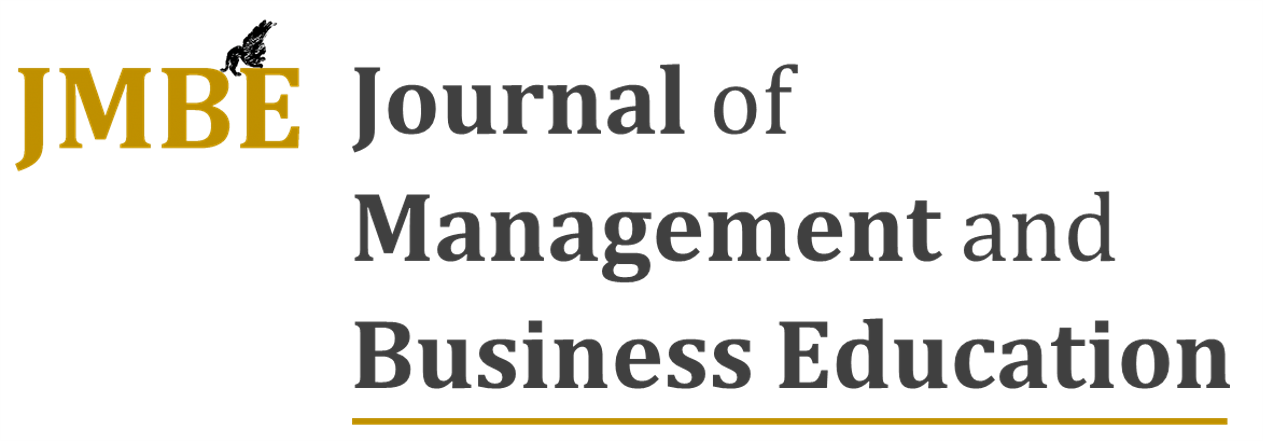Bibliometric approach to entrepreneurial education
DOI:
https://doi.org/10.35564/jmbe.2018.0013Keywords:
education, teaching, learning, entrepreneurship, entrepreneurialAbstract
This introduction provides a current vision of the situation in which research on entrepreneurship education is located. For this, a review of the state of the question in entrepreneurial education is developed. This analysis allows to interconnect the previous issue of the Journal of Management and Business Education (JMBE), with the current one and to remain within its mission, objectives and main characteristics, which cc explained below. Finally, the third issue of the journal is presented.
Downloads
References
Bae, T. J., Qian, S., Miao, C., & Fiet, J. O. (2014). The Relationship between Entrepreneurship Education and Entrepreneurial Intentions: A Meta-Analytic Review. Entrepreneurship theory and practice, 38(2), 217-254.
https://doi.org/10.1111/etap.12095
Barba-Sánchez, V. & Atienza-Sahuquillo, C. (2018). Educación emprendedora a través de una experiencia de learning by doing: el caso de las junior empresas. Journal of Management and Business Education, 1(2), 106-116.
https://doi.org/10.35564/jmbe.2018.0009
Baron, R. A. (2006). Opportunity recognition as pattern recognition: How entrepreneurs "connect the dots" to identify new business opportunities. Academy of management perspectives, 20(1), 104-119.
https://doi.org/10.5465/amp.2006.19873412
Bramwell, A., & Wolfe, D. A. (2008). Universities and regional economic development: The entrepreneurial University of Waterloo. Research policy, 37(8), 1175-1187.
https://doi.org/10.1016/j.respol.2008.04.016
DeTienne, D. R., & Chandler, G. N. (2004). Opportunity identification and its role in the entrepreneurial classroom: A pedagogical approach and empirical test. Academy of management learning & education, 3(3), 242-257.
https://doi.org/10.5465/amle.2004.14242103
Gibb, A. (2002). In pursuit of a new 'enterprise'and 'entrepreneurship'paradigm for learning: creative destruction, new values, new ways of doing things and new combinations of knowledge. International Journal of Management Reviews, 4(3), 233-269.
https://doi.org/10.1111/1468-2370.00086
Honig, B. (2004). Entrepreneurship education: Toward a model of contingency-based business planning. Academy of Management Learning & Education, 3(3), 258-273.
https://doi.org/10.5465/amle.2004.14242112
Katz, J. A. (2003). The chronology and intellectual trajectory of American entrepreneurship education: 1876-1999. Journal of business venturing, 18(2), 283-300.
https://doi.org/10.1016/S0883-9026(02)00098-8
Kuratko, D. F. (2005). The emergence of entrepreneurship education: Development, trends, and challenges. Entrepreneurship theory and practice, 29(5), 577-597.
https://doi.org/10.1111/j.1540-6520.2005.00099.x
Martin, B. C., McNally, J. J., & Kay, M. J. (2013). Examining the formation of human capital in entrepreneurship: A meta-analysis of entrepreneurship education outcomes. Journal of Business Venturing, 28(2), 211-224.
https://doi.org/10.1016/j.jbusvent.2012.03.002
McGee, J. E., Peterson, M., Mueller, S. L., & Sequeira, J. M. (2009). Entrepreneurial self‐efficacy: refining the measure. Entrepreneurship theory and Practice, 33(4), 965-988.
https://doi.org/10.1111/j.1540-6520.2009.00304.x
Neck, H. M., & Greene, P. G. (2011). Entrepreneurship education: known worlds and new frontiers. Journal of Small Business Management, 49(1), 55-70.
https://doi.org/10.1111/j.1540-627X.2010.00314.x
Oosterbeek, H., Van Praag, M., & Ijsselstein, A. (2010). The impact of entrepreneurship education on entrepreneurship skills and motivation. European economic review, 54(3), 442-454.
https://doi.org/10.1016/j.euroecorev.2009.08.002
Peterman, N. E., & Kennedy, J. (2003). Enterprise education: Influencing students' perceptions of entrepreneurship. Entrepreneurship theory and practice, 28(2), 129-144.
https://doi.org/10.1046/j.1540-6520.2003.00035.x
Pittaway, L., & Cope, J. (2007). Entrepreneurship education: A systematic review of the evidence. International small business journal, 25(5), 479-510.
https://doi.org/10.1177/0266242607080656
Pittaway, L., & Cope, J. (2007). Simulating entrepreneurial learning: Integrating experiential and collaborative approaches to learning. Management learning, 38(2), 211-233.
https://doi.org/10.1177/1350507607075776
Rasmussen, E. A., & Sørheim, R. (2006). Action-based entrepreneurship education. Technovation, 26(2), 185-194.
https://doi.org/10.1016/j.technovation.2005.06.012
Souitaris, V., Zerbinati, S., & Al-Laham, A. (2007). Do entrepreneurship programmes raise entrepreneurial intention of science and engineering students? The effect of learning, inspiration and resources. Journal of Business venturing, 22(4), 566-591.
https://doi.org/10.1016/j.jbusvent.2006.05.002
Vesper, K. H., & Gartner, W. B. (1997). Measuring progress in entrepreneurship education. Journal of Business venturing, 12(5), 403-421.
https://doi.org/10.1016/S0883-9026(97)00009-8
Von Graevenitz, G., Harhoff, D., & Weber, R. (2010). The effects of entrepreneurship education. Journal of Economic Behavior & Organization, 76(1), 90-112.
https://doi.org/10.1016/j.jebo.2010.02.015
Wilson, F., Kickul, J., & Marlino, D. (2007). Gender, Entrepreneurial Self‐Efficacy, and Entrepreneurial Career Intentions: Implications for Entrepreneurship Education 1. Entrepreneurship theory and practice, 31(3), 387-406.
Downloads
Published
How to Cite
Issue
Section
License
Copyright (c) 2023 Journal of Management and Business Education

This work is licensed under a Creative Commons Attribution-NonCommercial-ShareAlike 4.0 International License.
License terms at: https://creativecommons.org/licenses/by-nc/4.0/legalcode




